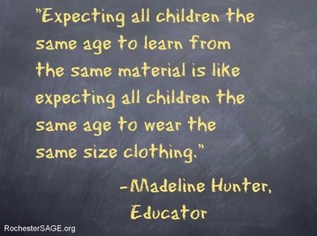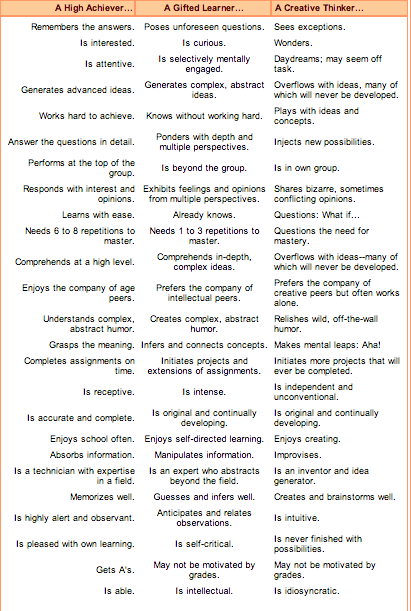WHAt does "gifted" mean anyways?
That's a great question! It's one that the most well-known and brightest minds of the gifted education community have been debating for years. Traditionally, people associate the term "gifted" with a high IQ. While this had been the sole method of identifying gifted students for decades, the gifted education community is broadening its criteria for admittance to the gifted program as we recognize the diverse ways in which our nation's youth can demonstrate giftedness.
Some believe that those born with a high IQ, traditionally known as the "gifted" deserve the lion's share of benefits of a gifted program. Others believe that gifted education should focus its attention on the "talented," or those who excel in a certain area to the extent that their ability in that area is obvious to all who observe them in their element. As creativity becomes more widely accepted as an exceptional quality, "talent" is becoming a more important part of many gifted programs.
Françoys Gangé synthesizes the two arguments by arguing that gifts are innate and by cultivating those gifts through motivation, we can bring out the talents that gifted people can express. Talents come about by having an aptitude that collides with a catalyst that could be external or internal, whereas gifts are innate aptitudes. Gangé does argue that even talented people must have some kind of innate gift, because otherwise “no selection process would be necessary, only efficient training.” He reminds us that the talented children are not without gifts. Gagné argues that both talented and gifted students should be included in gifted education, because they are not usually that different.
While none of us can definitively answer the question, "What does 'gifted' mean?" most of the people in the gifted education community merely want to serve children with high potential as best as they can. No matter how they are labelled or identified, gifted education professionals recognize that students who excel deserve an equitable education. This means that we are doing a disservice to our brightest students if we leave them in the regular classroom without extra enrichment and challenge. Without gifted education, we are failing those with the highest potential. Imagine if no one had challenged Einstein, Mozart, or Shakespeare. Our world would be a little less interesting without the products of the gifted.
Some believe that those born with a high IQ, traditionally known as the "gifted" deserve the lion's share of benefits of a gifted program. Others believe that gifted education should focus its attention on the "talented," or those who excel in a certain area to the extent that their ability in that area is obvious to all who observe them in their element. As creativity becomes more widely accepted as an exceptional quality, "talent" is becoming a more important part of many gifted programs.
Françoys Gangé synthesizes the two arguments by arguing that gifts are innate and by cultivating those gifts through motivation, we can bring out the talents that gifted people can express. Talents come about by having an aptitude that collides with a catalyst that could be external or internal, whereas gifts are innate aptitudes. Gangé does argue that even talented people must have some kind of innate gift, because otherwise “no selection process would be necessary, only efficient training.” He reminds us that the talented children are not without gifts. Gagné argues that both talented and gifted students should be included in gifted education, because they are not usually that different.
While none of us can definitively answer the question, "What does 'gifted' mean?" most of the people in the gifted education community merely want to serve children with high potential as best as they can. No matter how they are labelled or identified, gifted education professionals recognize that students who excel deserve an equitable education. This means that we are doing a disservice to our brightest students if we leave them in the regular classroom without extra enrichment and challenge. Without gifted education, we are failing those with the highest potential. Imagine if no one had challenged Einstein, Mozart, or Shakespeare. Our world would be a little less interesting without the products of the gifted.
So... What's this website all about?
In a perfect world, every school would be overflowing with funding for special education, the arts, extra curricular activities, and gifted education. In reality, however, our entire nation is in financial crisis and education budgets have been hacked to pieces all over the country.
Many schools just don't have the resources to adequately serve all of the gifted and talented students in their buildings. A good teacher always has his or her students' best interests at heart. When your district, administration, or gifted program isn't providing the needed assistance, you as a classroom teacher may need to take matters into your own hands and implement some gifted education strategies in your regular classroom.
This website will provide you with several different methods of infusing gifted education into your district, school, or classroom. This website will also provide you with resources, sample lesson plans, and a personal narrative about implementing gifted education curriculum in the regular education classroom. This website is intended for elementary school teachers, but many of the ideas and resources can be applied to any grade level.
Many schools just don't have the resources to adequately serve all of the gifted and talented students in their buildings. A good teacher always has his or her students' best interests at heart. When your district, administration, or gifted program isn't providing the needed assistance, you as a classroom teacher may need to take matters into your own hands and implement some gifted education strategies in your regular classroom.
This website will provide you with several different methods of infusing gifted education into your district, school, or classroom. This website will also provide you with resources, sample lesson plans, and a personal narrative about implementing gifted education curriculum in the regular education classroom. This website is intended for elementary school teachers, but many of the ideas and resources can be applied to any grade level.
references
Kingore, B. (Spring 2004). High Achiever, Gifted Learner, Creative Learner.
Understanding Our Gifted. Retrieved April 20, 2013 from http://www.bertiekingore.com/high-gt-create.htm.
(April 2013). Differentiation Study Session in Rochester Community Schools. In Rochester SAGE. Retrieved April 22, 2013 from http://rochestersage.org/.
Understanding Our Gifted. Retrieved April 20, 2013 from http://www.bertiekingore.com/high-gt-create.htm.
(April 2013). Differentiation Study Session in Rochester Community Schools. In Rochester SAGE. Retrieved April 22, 2013 from http://rochestersage.org/.


